We are delighted to announce the shortlists for the 2023 Michael Marks Awards for Poetry Pamphlets
The shortlisted poets and publishers, alongside the winning illustrator and Environmental Poet of the Year, appeared at our annual Awards Night, online and in person at the British Library, on Wednesday 13th December.
Overall winners were announced at the event
Watch again: Awards Night
Winners
Each year the event is open to the public and free to attend. sign up to o ur newsletter and social media for updates about next year’s event
Poetry Award shortlist
Kate Hendry, MX SIMP (Mariscat Press)
Fahad Al-Amoudi, When the Flies Come (Ignitionpress)
Courtney Conrad, I Am Evidence (Bloodaxe Books/Mslexia)
Blake Morrison, Skin & Blister (Mariscat Press)
Clementine E Burnley, Radical Pairings (Ignitionpress)
Sammy Weaver, Angola, America (Seren)
We would like to highlight that judge Fiona Benson recused herself from discussions about Angola, America, and that its shortlisting was based solely on the opinions of the other three judges.
Publisher’s Award shortlist
Out-Spoken Press
Mariscat Press
Guillemot Press
The Emma Press
The Michael Marks Poetry Award Shortlist
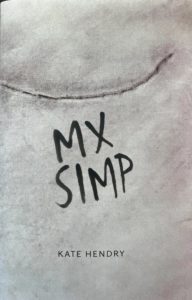
Kate Hendry, MX SIMP (Mariscat Press)
Judges’ Comments
MX SIMP is the medical abbreviation for what is called a simple mastectomy; written with black marker on a breast, and printed afterwards on the hand that holds it, ‘for the last time’, this abbreviation gives Kate Hendry’s pamphlet its title and its theme. Neither simple nor brief, the experiences Hendry portrays here are laid out with tender warmth and an understated poetic stylishness. As it combines the intense pain of cancer with wry humour and enormous heart in its arc, MX SIMP is a work of immense beauty, gratitude, and strength.
EARLY
is the word I insert in front of breast.
It’s the word my surgeon chose,
along with caught as if it were a cricket ball
thrown deep field or a killer pike,
best reeled in while still a jack.
Not unusual is the other phrase he likes.
And ostrogen receptive, which is
a good thing, a good thing. I want to hear
him say it again. We’ve caught it early?
I ask. As early as possible he says.
Ear-ly. I chant each syllable to slow my breath.
Ear-ly. I thank my surgeon, and the English language
for allowing me to place this adjective
before that noun and so delay saying cancer.
I wish I could start with very but the honest,
ungrammatical truth is only-just or
on-the-edge-of-not-being. Advancing,
if not advanced. To be completely accurate,
I should say T2NIMo with its neat row
of shrinking numbers but who would understand?
So I stick with early for the way it reminds me
of children’s nurseries, and the bird
which catches the worm, and music before
harmony and days for the start
of a long process that asks for patience.
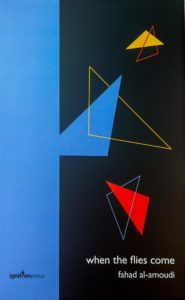
Fahad Al-Amoudi, When the Flies Come (Ignitionpress)
Judges’ Comments
Woven through Fahad Al-Amoudi’s When the Flies Come are imagined letters home, rendered in the voice of a young Ethiopian prince, Alemayehu, forcibly removed from his country in 1868 and detained in Britain until his death, aged 18. With extraordinary precision and delicacy, Al-Amoudi’s poems dissect colonial evil as they also magnify joy, ‘the world open[ing] / like a pistachio’. As it threads letter forms amongst poems for grief, for family, for Marvin Gaye, for bugs, When the Flies Come asks who gets to write letters home, and what those words home might look like.
the god of bad news and soft drinks
When the world was young and there were many gods —
big gods and small gods, the god of paper cuts,
the god of hailstones — they would come to visit us
as nosebleeds in hospital waiting rooms, nudging their chins
on the windowsill, the vending machine a kind of shrine.
I made offerings to the god of coca-cola:
a dice-throw of dead flies, crossed cutlery on paper plates.
These were the games we played. Last one standing
is a baobab. Neither of us would get to see each other grow
old.
Outside, a dog-cone of streetlight sputtered in the dark;
I answered a telephone box, naked as if struck by lightning;
and under the brass fist of clouds, the static of a dial tone,
a voice tried to steal itself back: look, Fahad, your mum passed away.
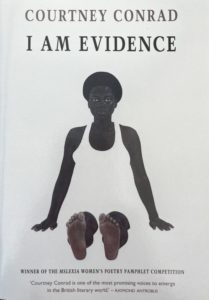
Courtney Conrad, I Am Evidence (Bloodaxe Books/Mslexia)
Judges’ Comments
The poems in this pamphlet give fierce witness to the precarity and turmoil of a violent and impoverished Jamaica. The poems are linguistically surefooted, and enriched by a rich, dynamic Jamaican patois; they are also technically incredibly accomplished. Through evocations, classifieds, stories, recipes and witness, we are immersed in the convulsions and mercies of a dangerously unequal society. While these poems bear witness to the most brutal violence, the collection is not without joy, because love is always present at the table. Although the pamphlet is a short form, I Am Evidence has the reach, ambition, structural integrity and humanity of a long novel. This pamphlet is obeah; wonderful, dangerous magic.
Kibba Yuh Mouth
My neighbours were the popular sibling duo in our complex,
fully stocked pantry, unlimited video games, and few rules.
I nicknamed her older brother Screw Face.
He drank Ting from a glass bottle like it was Red Stripe,
played Grand Theft Auto and spoke to the TV like a major drug lord.
No respectable teen boy volunteered to babysit his little sister and her friend.
But he did, he was the traffic cop
monitoring us while we drove Barbie Jeeps.
Once, he pulled us over behind the dumpster.
She paid him for both of us. I witnessed his…
I was sick every playtime
watched her from my bedroom.
He sat on the veranda, shot air bullets at my window,
and mouthed, informa fi dead.
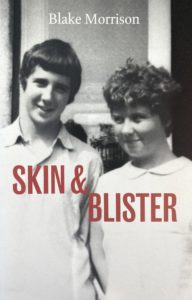
Blake Morrison, Skin & Blister (Mariscat Press)
Judges’ Comments
In cockney rhyming slang, ‘skin and blister’ equals ‘sister’. And it is Blake Morrison’s sister Gillian, now deceased, who is the subject of this series of poems. The title is doubly apt, the poet tells us in an end note, as their relationship was both intimate and painful. Here we have a single sestina followed by 20 sonnets. The tone is conversational and melancholic, with a very human sense of regret. Morrison’s subtle employment of classical structure and technique allows the raw emotion to shine right through.
13
Why do some of us leave and others stay?
Why did you stay, sitting tight in the same village
for sixty-odd years, rarely daring to stretch
beyond it and when you did only briefly,
like that tennis ball we had, on elastic,
that flew straight back? Why settle there for life
when you could have broken new ground for yourself?
Was it fear or was it love that made you stick?
The barn, the rookery, the meadow and moors:
once the retinitis pigmentosa
kicked in, this was the world you couldn’t see.
But curlews and lamb-bleats reached your ears
and roses your nostrils and fruit from the garden
your palate (there, I’ve answered my own question).
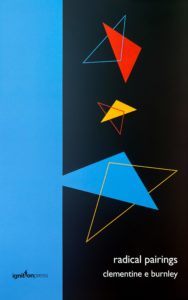
Clementine E Burnley, Radical Pairings (Ignitionpress)
Judges’ Comments
This is an incredible pamphlet of poems that gather round themes of difficult emigrations and resettlings, of painful dislocations and new beginnings, homesickness and resilience. Alive to the cultural contradictions between homes old and new, and the heart-work of maintaining relationships across this divide, the poems welcome, with wry humour and tender sensitivity a whole host of speakers. These voices are unforgettable, like the grandmothers asking “Who fed you eggs before you were two?” and, uproariously, “would you rather be a meal or a snack?” Burnley’s language and powers of description are hauntingly beautiful. This pamphlet is one of kindness, erudition, humour and consummate skill.
Wolf
though our ancestors hunted her kind
through highland rainforests
ten thousand years ago.
though nettles grow up over hill scars,
through a stand of dock
she watches, curious.
boys lay a perimeter of piss around a canvas tent.
triangled ears turn
to the sounds
of their small, safe deaths
their tenderness.
a wolf is spotted aboard a train in Brussels.
in pubs, on the Polish-German border
instead of musk deer
staghorn ferns are nailed to wooden trophy boards.
she leaves a boggy stink in stairwells near Glasgow Green.
the treads never wash clean of her.
watchfires linger
after three pregnant wolves are shot on the way to France.
near the Forest of Dean, a dog walker raises the alarm.
when night blots out the purple of pennyroyal
the search for wolves is abandoned
among brambles so thick
a pizza box is a smudge in the surveillance footage.
the DNA profile captured in her scat
is tagged, lone female.
she leaves a paw print between the daylilies.
the shadow of an overhead power line marks her flank.
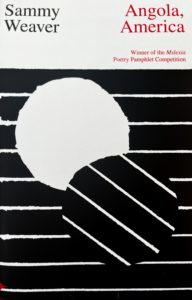
Sammy Weaver, Angola, America (Seren)
Judges’ Comments
Somewhere between the lyrical and plain graphic, Angola, America by Sammy Weaver blends empathy and humanity with raw, often visceral accounts of the infamous Louisiana maximum-security prison on the East side of the Mississippi River. In these correspondence-poems between an inmate on death row and a woman living in a narrowboat in the UK, Waver gives a voice to both a taboo subject and white guilt, as well as the cruelty of racialised politics and institutionalised imprisonment of Black people in America. Imaginatively and poignantly written, Weaver’s first pamphlet is a must-read, even as one often has to pause while encountering her timely, unnerving.
[ search ]
In the beginning the guard’s gloved hands
pat you down, searching for weapons,
his touch is weaponized, the muted duty
of his movements smooth along each of your arms.
Soon the guard’s touch is the only touch
from another
and you think of your mother
after bath time, the harbour of her chest
against yours, the rough-love of her towelling
you dry, reaching into all the nooks
and crannies, no cabbages behind the ears
she says. And yes, I guess searching the body
is another way of saying the body is a trove
of treasure and your touch a torch.
The Michael Marks Publisher's Award Shortlist
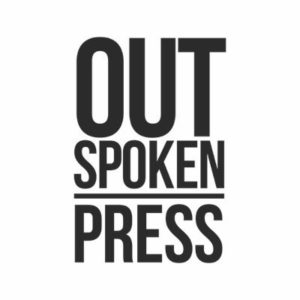
Judges’ Comments
These pamphlets maintain a subtly consistent design across the titles under review. Colours are muted; graphics are minimalistic but not austere; and the bright ice-white stock contrasts nicely with the low-key elegance of the cover designs. The thick paper has sufficient heft to allow for the slim pamphlets to be neatly perfect-bound, and the vertical score along the margin is an appealing user-friendly touch. The poetry is similarly consistent, in its themes of sex, intimacy and relationships. One has the sense that one knows, at least a little bit, what to expect from an Out-Spoken Press pamphlet, and can have faith in their quality control.

Judges’ Comments
Two Mariscat pamphlets MX SIMP by Kate Hendry and Skin and Blister by Blake Morrison made it on to our shortlist for the Poetry Award. Their submission also included three other extraordinary and wonderful pamphlets. We were impressed by the consistently high standard of the poetry, and the individuality that shone through the presentation of each pamphlet even while it retained a Mariscat ‘feel’ (partly literally, as Mariscat pamphlets are very tactile objects). We also found the scrupulous attention paid to finding the right typeface for each pamphlet incredibly impressive (and a bit mad?!). What a wonderful Press.
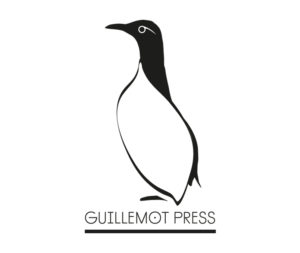
Judges’ Comments
There is no sense of compromise in Guillemot Press’s pamphlet-making; the attention to detail is total, and the pay-off is stunning. Whether it’s the cover papers and design elements tailored specifically for each individual poet and publication project, the understanding of environmentally sustainable papers and processes, editorial organisation and vision, the plans to develop the press in the coming year, or the quality of the poetry itself, Guillemot doesn’t put a foot wrong.
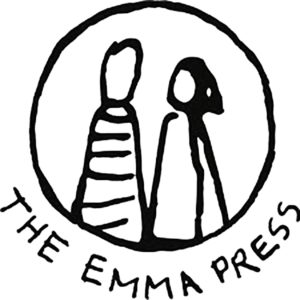
Judges’ Comments
We were impressed by the incredibly high standard of The Emma Press’s submissions to the Michael Marks Awards. The Emma Press has deliberately moved towards publishing fewer poetry pamphlets with an emphasis on the quality of writing, editorial, printing, promotion and authorial support. The individual publications honour the pamphlet itself. Strange gothic illustrations and beautiful cover artwork, all dovetail perfectly with the poetry. The love with which these pamphlets have been curated really shines through.


